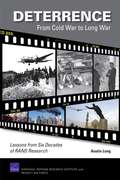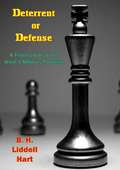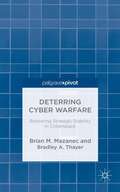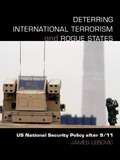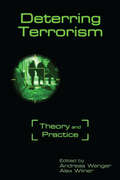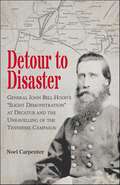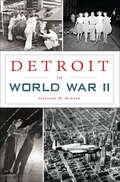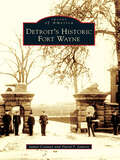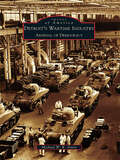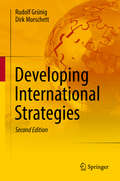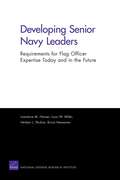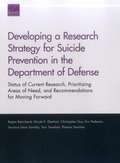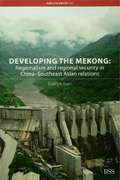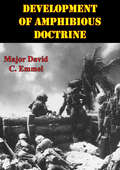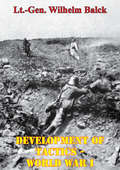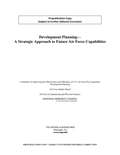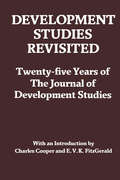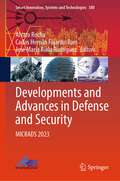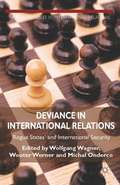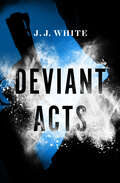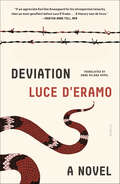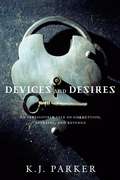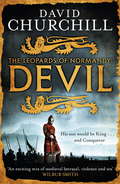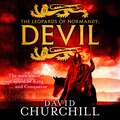- Table View
- List View
Deterrence: Lessons from Six Decades of Rand Deterrence Research
by Austin LongSince its inception six decades ago, the RAND Corporation has been one of the key institutional homes for the study of deterrence. This book examines much of this research for lessons relevant to the current and future strategic environment. It is therefore part intellectual history and part policy recommendation, intended to encourage debate and discussion on how deterrence can best be incorporated into U.S. strategy.
Deterrent or Defense: A Fresh Look at the West’s Military Position
by B. H. Liddell HartHere is a much-needed assessment and summing-up on four current strategic situation by B. H. Liddell Hart, the leading military analyst of our time. Taking a clear, hard look at Western defense capabilities and strategic planning, particularly as they are embodied in NATO, he has come up with suggestions for radical but vital revisions in our defense policies.Fifteen years have elapsed since Captain Liddell Hart forecast the consequences of atom-bomb diplomacy. Now, as the NATO powers move uneasily forward in the 1960’s, he shows how the development of the H-bomb—and, indeed, the multiplication in general of nuclear weapons on both sides—has become on the one hand, increasingly self-inhibiting, and, on the other, increasingly precarious as a protective insurance policy, especially in view of the development of log-range missiles.The natural consequences of the current nuclear parity is nuclear nullity. Thus, the nuclear deterrent, in which the West has put so much trust, is fading except as a deterrent to its own kind of action. But the Western powers have not yet come to grips with the problem of finding an adequate and effective replacement for this “fading deterrent.” As a result, the West now finds itself gravely hampered in any attempt to resist the more subtle forms of aggression and pressure.Having carefully analyzed the ailment, the author offers a hopeful cure, demonstrating how the weakness of the West’s present position can be remedied without an intolerable outlay in strain and cost.
Deterring Cyber Warfare: Bolstering Strategic Stability in Cyberspace
by Brian M. Mazanec Bradley A. ThayerWhile the deterrence of cyber attacks is one of the most important issues facing the United States and other nations, the application of deterrence theory to the cyber realm is problematic. This study introduces cyber warfare and reviews the challenges associated with deterring cyber attacks, offering key recommendations to aid the deterrence of major cyber attacks.
Deterring International Terrorism and Rogue States: US National Security Policy after 9/11 (Contemporary Security Studies)
by James H. LebovicThis new study challenges the widely held view that many current US adversaries cannot be deterred, maintaining that deterrence is not a relic of the Cold War period and that it should shape US policies toward so-called ‘rogue states’ and terror groups. James Lebovic argues that deterrence principles continue to apply, and focuses upon the ‘three pillars’ of the Bush administration’s national security policy: missile defence, which preoccupied the administration until September 11, 2001 pre-emption, which became the US focus with the September 11 attacks and US success in overthrowing the Taliban regime in Afghanistan homeland security, which the administration has portrayed as more a natural response to threat than an aspect of policy that must be reconciled with the other pillars. Deterring International Terrorism and Rogue States asserts that bad offences and defences have been endemic to the current US policy approach, leading US policy makers to pursue policies that require them to do everything without adequate concern for resource trade-offs, overreach, and unintended consequences. This book will be of great interest to students of US foreign policy, national and international security, terrorism and international relations in general.
Deterring Terrorism: Theory and Practice
by Andreas Wenger Alex WilnerDuring the Cold War, deterrence theory was the cornerstone of U. S. foreign policy. Following the 9/11 terrorist attacks, however, popular wisdom dictated that terrorist organizations and radical fanatics could not be deterred-and governments shifted their attention to combating terrorism rather than deterring it. This book challenges that prevailing assumption and offers insight as to when and where terrorism can be deterred. It first identifies how and where theories of deterrence apply to counterterrorism, highlighting how traditional and less-traditional notions of deterrence can be applied to evolving terrorist threats. It then applies these theoretical propositions to real-world threats to establish the role deterrence has within a dynamic counterterrorism strategy-and to identify how metrics can be created for measuring the success of terrorism deterrence strategies. In sum, it provides a foundation for developing effective counterterrorism policies to help states contain or curtail the terrorism challenges they face.
Detour to Disaster: General John Bell Hood's "Slight Demonstration" at Decatur and the Unraveling of the Tennessee Campaign
by Noel CarpenterA detailed account of the pivotal decision made by a young army commander to march to Decatur, and the consequential combat that ensued. In October of 1864, Confederate General John Bell Hood set out through Alabama on what would be the final campaign of the Army of Tennessee. One event in particular, overlooked and misunderstood for generations, portended what was to follow and is the subject of Noel Carpenter’s Detour to Disaster: General John Bell Hood’s “Slight Demonstration” at Decatur and the Unravelling of the Tennessee Campaign. In this fascinating and meticulously detailed and documented account—the first book-length study of the weighty decision to march to Decatur and the combat that followed there—Carpenter investigates the circumstances surrounding these matters and how they overwhelmed the controversial young army commander and potentially doomed his daring invasion. Detour to Disaster is required reading for everyone interested in the Western Theater, and especially the doomed Tennessee Campaign.
Detroit in World War II
by Gregory D. SumnerA history of everyday life in the Motor City during the Second World War and the contributions its citizens made to the war effort. When President Roosevelt called for the country to be the great &“Arsenal of Democracy,&” Detroit helped turn the tide against fascism with its industrial might. Locals were committed to the cause, putting careers and personal ambitions on hold. Factories were retooled from the ground up. Industrialist Henry Ford, First Lady Eleanor Roosevelt, aviator Charles Lindbergh, legendary boxer Joe Louis, future baseball Hall of Famer Hank Greenberg and the real-life Rosie the Riveters all helped drive the city that was &“forging thunderbolts&” for the front lines. With a panoramic narrative, author Gregory D. Sumner chronicles the wartime sacrifices, contributions and everyday life of the Motor City.
Detroit's Historic Fort Wayne (Images of America)
by James Conway David F. JamrozMichigan's historic Fort Wayne, located on the narrowest point of the Detroit River, is named for Revolutionary War hero Gen. "Mad" Anthony Wayne. The fort was built in the 1840s to protect Detroit from British invasion following the strife of the 1838 Patriot War in Canada. Originally constructed of earth and wood, the fortifications were rebuilt in masonry during the Civil War, but the fort has never mounted cannons, as peace came to the international border and remains to this day. Fort Wayne has served the military as a training center, home to infantry regiments, supply depot, prisoner of war camp, and major induction center. It was a source of work for the unemployed during the Great Depression, a place of confinement during the Red Scare of 1920, and home for those displaced by civil unrest in Detroit during the 1960s. The fort continues to invite people to its riverfront view, not as soldiers but as guests, to enjoy community events on its broad parade fields and to learn about those who lived, drilled, and worked there.
Detroit's Wartime Industry: Arsenal of Democracy (Images of America)
by Michael W. DavisJust as Detroit symbolizes the U.S. automobile industry, during World War II it also came to stand for all American industry's conversion from civilian goods to war material. The label "Arsenal of Democracy" was coined by Pres. Franklin D. Roosevelt in a fireside chat radio broadcast on December 29, 1940, nearly a year before the United States formally entered the war. Here is the pictorial story of one Detroiter's unique leadership in the miraculous speed Detroit's mass-production capacity was shifted to output of tanks, trucks, guns, and airplanes to support America's victory and of the struggles of civilians on the home front.
Developing International Strategies
by Rudolf Grünig Dirk MorschettThis book helps medium-sized companies adapt to the challenges and take advantage of the opportunities of the growing international business climate. The authors offer practical, usable advice on production, sourcing and strategic planning.
Developing Senior Navy Leaders
by Bruce Newsome Lawrence M. Hanser Herbert J. Shukiar Louis W. MillerCould U.S. Navy officers be better prepared to become flag officers? This study examines the kinds of expertise required for successful performance in Navy flag billets, and whether recent pools of officers possess this experience. The authors also examine Navy trends over the past decade to identify the types of expertise likely to become more important for Navy leaders in the future.
Developing a Research Strategy for Suicide Prevention in the Department of Defense: Status of Current Research, Prioritizing Areas of Need, and Recommendations for Moving Forward
by Terri Tanielian Rajeev Ramchand Phoenix Voorhies Nicole K. Eberhart Christopher Guo Eric Pedersen Terrance Dean SavitskyTo support U. S. Department of Defense (DoD) efforts to create a unified, comprehensive strategic plan for suicide prevention research, a RAND study cataloged studies funded by DoD and other entities, examined whether current research maps to DoD's strategic research needs, and provided recommendations to encourage better alignment and narrow the research-practice gap when it comes to disseminating findings to programs serving military personnel.
Developing the Mekong: Regionalism and Regional Security in China–Southeast Asian Relations (Adelphi series)
by Evelyn GohIn Southeast Asia, China’s growing economic and political strength has been accompanied by adept diplomacy and active promotion of regional cooperation, institutions and integration. Southeast Asian states and China engage in ‘strategic regionalism’: they seek regional membership for regime legitimation and collective bargaining; and regional integration to enhance economic development, regarded as essential for ensuring national and regime security. Sino-Southeast Asian regionalism is exemplified by the development plans for the Mekong River basin, where ambitious projects for building regional infrastructural linkages and trade contribute to mediating the security concerns of the Mekong countries. However, Mekong regionalism also generates new insecurities. Developing the resources of the Mekong has led to serious challenges in terms of governance, distribution and economic externalities. Resource-allocation and exploitation conflicts occur most obviously within the realm of water projects, especially hydropower development programmes. While such disputes are not likely to erupt into armed conflict because of the power asymmetry between China and the lower Mekong states, they exacerbate Southeast Asian concerns about China’s rise and undermine Chinese rhetoric about peaceful development. But the negative security consequences of developing the Mekong are also due to the shared economic imperative, and the Southeast Asian states’ own difficulties with collective action due to existing intramural conflicts.
Development Of Amphibious Doctrine
by Major David C. EmmelAlthough the U.S. had conducted amphibious operations since the Revolutionary War, it was not until after the Spanish-American War that the military services attempted to codify procedures in doctrine. Early emphasis focused on command relationships and the responsibilities of commanders, eventually expanding to incorporate operational concepts, tactical techniques, and the necessary equipment. In an environment characterized by inter-service rivalry, as well as monetary and materiel constraints, dedicated individuals and organizations overcame numerous obstacles to develop, practice, and successfully execute amphibious operations in World War II. This thesis examines the evolutionary development of amphibious doctrine by the U.S. Marine Corps, Army, and Navy, and the employment of that doctrine during Operations Watchtower and Torch in World War II. The examination includes an analysis of the historical efforts to develop innovative solutions to a wide range of challenges the services faced at the beginning of the 20th Century leading up to World War II. How the leadership solved those challenges informs the efforts of current leadership in addressing contemporary doctrinal, operational, and tactical challenges and those of the future.
Development Of Tactics - World War I [Illustrated Edition]
by Harry Bell Lt.-Gen. Wilhelm BalckIncludes the First World War Illustrations Pack - 73 battle plans and diagrams and 198 photosLt.-Gen. Wilhelm Balck was a Prussian General, whose service during the First World War with the 51st Division gained him the highest German honour, the coveted Pour le Mérite. Balck was also a noted military writer, in this most valuable study the author discusses the development of tactics within the German Army during World War I. The treatise was considered so valuable that it was immediately translated into English by the U.S. General Service School and widely read. In his native Germany Black's works greatly influenced post-war German thinking about tactics and strategy in the military circles that would become the officer corps of the Wehrmacht.
Development Planning: A Strategic Approach to Future Air Force Capabilities
by Committee on Improving the Effectiveness Efficiency of U.S. Air Force Pre-Acquisition Development PlanningThe development and application of technology has been an essential part of U. S. airpower, leading to a century of air supremacy. But that developmental path has rarely been straight, and it has never been smooth. Only the extraordinary efforts of exceptional leadership - in the Air Forces and the wider Department of Defense, in science and in industry - have made the triumphs of military airpower possible. "Development Planning" provides recommendations to improve development planning for near-term acquisition projects, concepts not quite ready for acquisition, corporate strategic plans, and training of acquisition personnel. This report reviews past uses of development planning by the Air Force, and offers an organizational construct that will help the Air Force across its core functions. Developmental planning, used properly by experienced practitioners, can provide the Air Force leadership with a tool to answer the critical question, Over the next 20 years in 5-year increments, what capability gaps will the Air Force have that must be filled? Development planning will also provide for development of the workforce skills needed to think strategically and to defectively define and close the capability gap. This report describes what development planning could be and should be for the Air Force.
Development Studies Revisited: Twenty-five Years of the "Journal of Development Studies"
by Charles Cooper E. V. FitzGeraldFirst published in 1989. The Journal of Development Studies was founded 25 years ago as a professional journal for what had by then become an established sub-discipline within British social science. The Journal has consistently published a broad spectrum of British research on development studies - a catholicity that has been reflected in the composition of the Editorial Board over the years - and has always welcomed authors from the USA, the European Continent, and above all from the Third World. Collated form the last twenty-five years of the journal presented here are a collection of 20-odd papers that represent less than three per cent of articles published since 1964.
Developments and Advances in Defense and Security: MICRADS 2023 (Smart Innovation, Systems and Technologies #380)
by Álvaro Rocha José María Riola Rodríguez Carlos Hernán Fajardo-ToroThis book gathers the proceedings of the Multidisciplinary International Conference of Research Applied to Defense and Security (MICRADS 2023), held at Graduate School of the Colombian Air Force, in Bogota, Colombia, during July 6–8, 2023. It covers a broad range of topics in systems, communication, and defense; strategy and political–administrative vision in defense; and engineering and technologies applied to defense. Given its scope, it offers a valuable resource for practitioners, researchers, and students alike.
Deviance in International Relations
by Wouter Werner Wolfgang Wagner Michal OndercoRogue states' have been high on the policy agenda for many years but their theoretical significance for international relations has remained poorly understood. In contrast to the bulk of writings on 'rogue states' that address them merely as a policy challenge, this book studies what we can learn from deviance about international politics.
Deviant Acts
by J.J. WhiteA haunted, heroin-addicted Vietnam vet&’s new PI gig might turn his life around—or end it: &“[Hurst] is crazy as a loon, funny as hell, and deadly serious.&” —Sterling Watson, author of Night Letter Jackson Hurst is not in a good place. The only thing that eases the pain is the heroin he&’s been addicted to since his time in Vietnam—and it&’s already cost him his job and his girlfriend. The downward spiral is only going to continue unless something changes. Then he&’s given an opportunity by his aunt Camille, a Vermont millionaire who wants to hire Jackson to rescue her twenty-year-old daughter from kidnappers. Camille will spare no expense to get Cheryl back—she also wants the kidnappers dead. And Jackson desperately needs the money. The question is whether he can stay clean long enough to do the job—and more importantly, whether he can bring himself to kill again . . . From the award-winning author of Nisei and other novels, this is both a gritty detective story and a portrait of one down-and-out man&’s quest for redemption in 1970s America.
Deviation: A Novel
by Luce D'EramoA devoted fascist changes her mind and her life after witnessing the horrors of the HolocaustFirst published in Italy in 1979, Luce D’Eramo’s Deviation is a seminal work in Holocaust literature. It is a book that not only confronts evil head-on but expands that confrontation into a complex and intricately structured work of fiction, which has claims to standing among the greatest Italian novels of the twentieth century.Lucia is a young Italian girl from a bourgeois fascist family. In the early 1940s, when she first hears about the atrocities being perpetrated in the Nazi concentration camps, she is doubtful and confused, unable to reconcile such stories with the ideology in which she’s been raised. Wanting to disprove these “slanders” on Hitler’s Reich, she decides to see for herself, running away from home and heading for Germany, where she intends to volunteer as camp labor. The journey is a harrowing, surreal descent into hell, which finds Lucia confronting the stark and brutal realities of life under Nazi rule, a life in which continual violence and fear are simply the norm. Soon it becomes clear that she must get away, but how can she possibly go back to her old life knowing what she now knows? Besides, getting out may not be as simple as getting in.Finally available in English translation, Deviation is at once a personal testament, a work of the imagination, an investigation into the limits of memory, a warning to future generations, and a visceral scream at the horrors of the world.
Devices and Desires (Engineer #1)
by K. J. ParkerWhen an engineer is sentenced to death for a petty transgression of guild law, he flees the city, leaving behind his wife and daughter. Forced into exile, he seeks a terrible vengeance -- one that will leave a trail of death and destruction in its wake. But he will not be able to achieve this by himself. He must draw up his plans using the blood of others... In a compelling tale of intrigue and injustice, K. J. Parker's embittered hero takes up arms against his enemies, using the only weapons he has left to him: his ingenuity and his passion -- his devices and desires. "A richly textured and emotionally complex fantasy...Highly recommended." --- Library Journal (Starred Review) "When so many fantasy sagas are tired, warmed-over affairs, a writer like K.J. Parker is more of a hurricane than a breath of fresh air." --- Dreamwatch
Devil (Leopards of Normandy 1): A vivid historical blockbuster of power, intrigue and action
by David Churchill**From the co-author of the No.1 bestselling Wilbur Smith novel, WAR CRY**The fate of England hangs in the balance of a fight between brothers...In DEVIL, David Churchill writes with the immediacy of Conn Iggulden, the epic ambition of Bernard Cornwell and the plotting of CJ Sansom. The Leopards of Normandy trilogy tells the story of William the Conqueror in all its wild, intoxicating, unfailingly dramatic glory.The noble families of Europe are tearing themselves apart in their lust for power and wealth.Emma, Queen of England, is in agony over the succession to her husband Canute's throne ... while her brother, the Duke of Normandy's sons battle in the wake of his death.Robert, the younger son, has been cheated of Normandy's mightiest castle and sets out to take it by force. He emerges from a bloody siege victorious and in love with a beautiful - and pregnant - peasant girl.Robert's child will be mocked as William the bastard. But we have another name for him... Conqueror.David Churchill paints a world seething with rivalry and intrigue, where assassins are never short of work. The fight for the Royal Crown of England continues in the second and third books of the Leopards of Normandy trilogy, DUKE and CONQUEROR.What readers are saying about DEVIL:'This is a most remarkable book, full of wonderful storytelling and historical details. Absolutely outstanding, immaculate and thrilling' 'An exciting and well-told story, backed up by first class research, an extreme attention to detail and strong characterisation which also fits with the historical record. I thoroughly enjoyed it from cover to cover'
Devil (Leopards of Normandy 1): A vivid historical blockbuster of power, intrigue and action
by David Churchill**From the co-author of the No.1 bestselling Wilbur Smith novel, WAR CRY**The fate of England hangs in the balance of a fight between brothers...In DEVIL, David Churchill writes with the immediacy of Conn Iggulden, the epic ambition of Bernard Cornwell and the plotting of CJ Sansom. The Leopards of Normandy trilogy tells the story of William the Conqueror in all its wild, intoxicating, unfailingly dramatic glory.The noble families of Europe are tearing themselves apart in their lust for power and wealth.Emma, Queen of England, is in agony over the succession to her husband Canute's throne ... while her brother, the Duke of Normandy's sons battle in the wake of his death.Robert, the younger son, has been cheated of Normandy's mightiest castle and sets out to take it by force. He emerges from a bloody siege victorious and in love with a beautiful - and pregnant - peasant girl.Robert's child will be mocked as William the bastard. But we have another name for him... Conqueror.David Churchill paints a world seething with rivalry and intrigue, where assassins are never short of work. The fight for the Royal Crown of England continues in the second and third books of the Leopards of Normandy trilogy, DUKE and CONQUEROR.What readers are saying about DEVIL:'This is a most remarkable book, full of wonderful storytelling and historical details. Absolutely outstanding, immaculate and thrilling' 'An exciting and well-told story, backed up by first class research, an extreme attention to detail and strong characterisation which also fits with the historical record. I thoroughly enjoyed it from cover to cover'
Devil (Leopards of Normandy 1): A vivid historical blockbuster of power, intrigue and action
by David ChurchillThe Devil and his Bastard son ...Robert of Normandy is handsome, brave and impetuous - and has just seized Normandy's mightiest castle. But his older brother, Richard, the Duke of Normandy, wants it back ... and will take it by force if need be.Herleva of Falaise is the mere daughter of a tanner but she's more beautiful than any princess and when she and Robert meet, together they will change the course of history.Their illegitimate son, William, is born into a world of murder and intrigue, where families are torn apart by bitter rivalries, renegade warlords stop at nothing in their lust for power and wealth, and professional assassins are never short of work.His enemies will mock him as William the Bastard. But we have another name for him: Conqueror.(P)2015 Headline Digital
